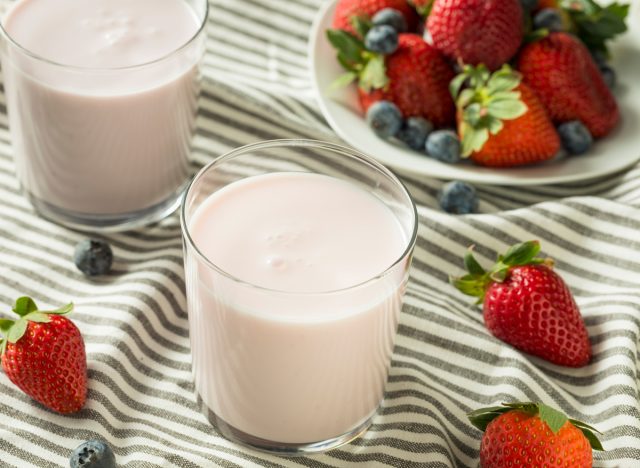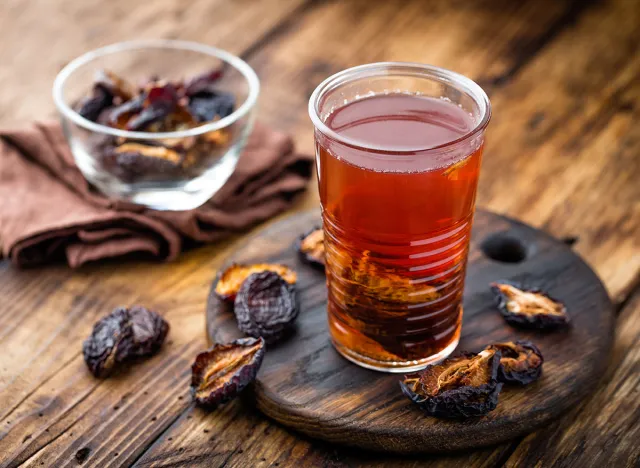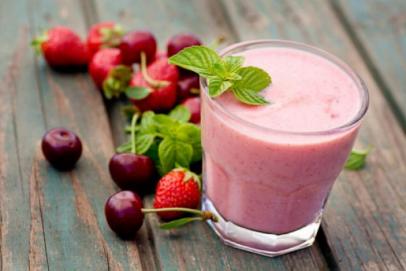Start your morning off right with a healthy gut.

Having a healthy gut microbiome helps to control your overall gut health. Your gut microbiome is made up of trillions of microorganisms, of which some are considered “good for you,” while some are “bad.” The most important part is that it’s ok to have levels of “bad” bacteria in your gut, as long as you have a balance of the good guys. If your microbiome is out of whack, then you’re at greater risk for disease. An unbalanced microbiome may lead to the risk of irritable bowel syndrome, inflammatory bowel disease, obesity, and even cancer. There are things that you can do in your everyday life to ensure you reduce your risk for diseases, including watching what you eat and being mindful of certain drinking habits that promote gut health.
More specifically, if you feel like you’re at risk or an imbalanced gut microbiome or other gut health-related issue, or just want to focus more on the overall state of your gut, try starting with your morning routine. We spoke with Jen Bruning, MS, RDN, LDN, spokesperson for the Academy of Nutrition and Dietetics, regarding some morning drinking habits to support your gut health.
1.Sip on some kefir in the morning.

While many people know about eating yogurt as a way to get a dose of probiotics, some may not realize that yogurt’s drinkable cousin, kefir, also contains gut-healthy probiotics as well. According to a report from Frontiers in Microbiology, kefir is a fermented dairy product that, because of its probiotic content, can aid in a healthy gut microbiome. This can happen because the probiotics in kefir can help your gut by introducing new bacterial species into your gastrointestinal tract, as well as helping the existing beneficial bacteria grow at a healthier rate.
Along with helping to promote bacterial growth in the actual gut microbiome, kefir is also known to help aid in digestion and improve your overall gastrointestinal health in this way, according to Nutrition Research Reviews.
2.Drink plenty of water.

According to Bruning, water is our primary and best source of hydration. And having some water in the morning is a good start to get your day going.
“We’re dehydrated when we wake up, so hydrating in the morning is crucial for getting us to perform at our best,” says Bruning. “Plus, dehydration can cause constipation, because fiber needs water to do its job. Drinking water in the morning is a great way to start the day right for our gut and overall health.”
Some studies, like one from the Journal of Nutrition, have also shown that those who drink more water may have more diversity in their gut microbiome compared to those who don’t drink as much water. And interestingly enough, well water provided the most diversity among other types of water. While many of us probably don’t have access to well water, any type will still provide you with the basic hydration your body needs.
3.Enjoy a cup of coffee.

This is good news for the coffee lovers who need their morning pick-me-up! “A cup of coffee can help you stay regular,” says Bruning. “And since it’s normally consumed in the morning, it has earned its place on this list!”
Bruning continues to suggest that while regular coffee has the most potent effect, it isn’t just caffeine that is supporting your digestion.
“Decaf coffee can also stimulate the body to move its bowels,” says Bruning. “Drinking coffee may even favorably affect the composition of our gut microbiome.” However, it’s important to note a couple of things. “Don’t overdo it on coffee for the sake of gut health,” adds Bruning. “But if you regularly enjoy a cup of coffee in the morning without adverse effects, your gut may just thank you for it.”
Examples of the adverse effects of coffee, according to the Mayo Clinic, would be feelings of anxiety or nervousness, jitters, headaches, fast heartbeat, and irritability. However, these most often occur after too much caffeine is consumed.
4.Include fiber-containing drinks.

Another way to get the juices flowing is by drinking your fiber.
“Some juices contain a dose of fiber, like prune juice and some tomato-based juices,” explains Bruning. “A fiber supplement mixed into water or juice can help you start the day with a dose of fiber.”
Bruning’s suggestion is especially helpful, considering how the latest research on Americans’ daily fiber intake shows that only about 7% of the population gets enough of this macro into their daily diet. Also, she adds that a mixture of soluble and insoluble fiber is key to health and healthy bowels.
Soluble fiber may help improve digestion, while insoluble fiber may soften stool, making this the perfect team for a healthy gut. According to Nutrients, diets that are low in fiber have been linked to “gut-related diseases” like diabetes, inflammatory bowel disease, and metabolic syndrome, as well as altering the gut microbiome in a negative way.
“If you struggle to get enough fiber in your day as so many people do, then starting the day with a fiber-containing beverage may help meet your needs,” she says.
5.Incorporate a smoothie.

Smoothies are a great way to get in any fruits you may not have time for otherwise throughout the day. It also makes for a refreshing and rejuvenating start to your morning.
“Use fiber-rich fruits like berry blends and include ground flax or chia seeds for added nutrients and fiber,” Bruning suggests. “Smoothies can give you the one-two punch of fiber and the liquid it needs to help you maintain a healthy gut.”
Another research example of how fiber can impact your gut in a positive way is from a study published in Microbial Ecology. This study found that increasing your fiber was linked to greater diversity in your microbiome and gut health, even after only two weeks.
So, whether you choose to reach for the water, coffee, smoothie, kefir, of prune juice—or maybe a combination of a few, you’ll most likely be doing your body some favors by pursuing drinking habits that help your gut health.
A previous version of this story was published on August 13, 2022. It has been updated to include additional copy and proofreading revisions, additional research, and updated contextual links.
Source: https://www.eatthis.com








